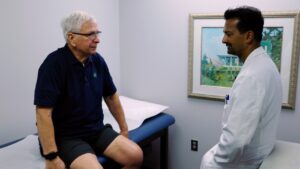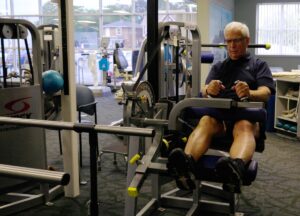Craig and Gaye Moody held hands as they strolled along the boardwalk near the Blue River Bridge in Port Huron, Michigan.
The Moodys walk to exercise and spend time together beside the St. Clair River, at nearby parks or in their neighborhood.
“It’s really good to have someone to walk with, and I knew he enjoyed it,” Gaye said. “We live in a subdivision that you can easily walk two miles just by going in and out of the various streets. So, it’s been a really important part of our life.”
Recently, pain and irritation in his left knee began to interfere with Craig’s walks with Gaye and other activities.
“Last year, I wasn’t able to walk as far and long as she could. It got to the point where I could only do a mile — and I could do it only at my pace,” he said. “The pounding of the concrete was very irritating and made it sore. So, that’s when I knew that something had to be done.”
Patient Chooses Robot-Assisted Surgery
X-rays verified that Craig, 78, had end-stage arthritis in his knee.
Orthopedic surgeon Rajesh B. Makim, MD, said Craig explored many knee pain treatments for more than five years. Nonsurgical measures included cortisone injections, physical therapy, weight loss and activity modification.
“He was using a cane,” Dr. Makim said. “His knee was very stiff and very painful, and it interfered with his activities of daily living. He couldn’t enjoy the things that he wanted to do.”

“My knee wasn’t going to get any better,” he said. “Even with physical therapy before, it was just bone-on-bone. I just couldn’t move.”
In traditional and robotic-assisted surgery, surgeons replace the knee’s damaged bone and cartilage with prosthetic joint components called implants.
For Craig’s procedure, Dr. Makim used a robotics platform. The system uses a CT scan of a patient’s joint to develop a personalized surgical plan. During the surgery, the surgeon guides a robotic arm to remove arthritic bone and cartilage from the knee.
Robotics is a “very sophisticated tool” used under the guidance of the surgeon, said orthopedic surgeon William Braaksma, MD.
“It is not a substitute for judgment or skill in the operating room,” he said. “It requires skill, and the surgeon has to know what they’re doing to make it work.”
The accurate and precise robotic technology allows surgeons “to do the knee replacement with very minimal soft tissue releases and to use the implant in the cuts to balance the knee,” Dr. Braaksma said. As a result, he said patients should experience “less pain, less swelling and faster recovery.”
Regaining Mobility, Range of Motion
Within a few hours of his procedure, Craig was discharged from Blue Water Surgery Center. The center provided a walker for him to use at home, where his wife kept an eye on his progress.
Two days later, Craig underwent a post-operative exam. He scheduled physical therapy sessions to assist with exercises to strengthen his knee.
“When they tell you to do some exercises, you do these exercises,” Craig said. “If you don’t do the exercises, you’re not going to get the benefits that the surgeon’s done for you.”

“I had my balance,” he said. “I could move around the house without a problem. As long as I was on concrete, I was fine.”
Four to six weeks after knee replacement surgery, patients generally resume daily household activities, including walking, sitting, standing and climbing stairs.
Craig was cleared to drive after four weeks and mowed his lawn two months after surgery. The Moodys also resumed their daily walks together.
“He’s at the same pace I am, and he is not lagging behind. He doesn’t stop and turn around and go back,” Gaye said. “And, if he thinks he hasn’t gone far enough, he’ll go another block or two.”
Most knee replacement patients experience significantly reduced pain, improved mobility and a better quality of life.
“That’s one thing about knee replacement — it’s basically one of the most successful operations in orthopedics,” Dr. Makim said. “And, it’s one of the most life changing for people.”
Surgery Centers Benefit Patients
Around 790,000 knee replacement surgeries are performed each year in the United States. Your doctor may recommend knee replacement surgery if you experience any of the following:
- Severe knee pain or stiffness that limits everyday activities, including walking, climbing stairs and getting in and out of chairs
- Moderate or severe knee pain while resting, either day or night
- Chronic knee inflammation and swelling that does not improve with rest or medications
- Knee deformity — a bowing in or out of the knee
- Failure to improve substantially with anti-inflammatory medications, cortisone injections, lubricating injections, physical therapy or other surgeries
According to the American Academy of Orthopaedic Surgeons, more than 50 percent of joint replacements will be performed on an outpatient basis by 2026.
Various factors determine whether patients are suitable for outpatient surgery, such as their age, existing medical conditions and the support they receive at home.
Dr. Makim said procedures at ambulatory surgery centers benefit patients.
“The operation is basically the same as what we would do at the hospital,” he said. “The costs are lower, and we have a more streamlined approach to getting people in and out of the door without compromising any patient care.”
Don’t Delay Your Treatment

“Thankfully, nowadays, knee replacement surgery is a very safe operation that is enjoyed by literally hundreds of thousands of people a year in the United States,” Dr. Makim said.
As Craig’s activity level increases, Gaye celebrates her husband’s recovery.
“I’m excited because it’s good to see him excited and not hurting,” she said. “He’s back, and it’s wonderful.”
Craig said he views the prominent scar on his knee as “a success story.”
“This knee was shot, and now it’s not,” he said, smiling.
This article is designed for educational purposes only. The information provided should not be used for diagnosing or treating a health concern or disease. It is not a substitute for professional care. If you have or suspect you may have a health concern, you should consult your healthcare provider.



